You might be wondering if the iPhone 14 can take a swim without consequences. With its IP68 rating, it's designed to withstand water exposure to a certain extent, but that doesn't mean it's completely foolproof. Many users assume this rating guarantees total waterproofing, yet real-world scenarios tell a different story. What does this really mean for your device in everyday life? The answer might surprise you, especially when considering how water resistance can change over time. Let's explore the implications of this rating and what you need to know to keep your phone safe.
Iphone 14 Water Resistance Rating
The iPhone 14 boasts an impressive water resistance rating, which is essential for users who often find themselves in wet environments. With its IP68 rating, the device can withstand submersion in water up to 6 meters for up to 30 minutes. This level of water resistance considerably enhances your iPhone durability, giving you peace of mind when using the phone near water, whether you're at the beach, pool, or caught in the rain.
It's important to understand what this rating means for your daily use. While the iPhone 14 is designed to resist water damage, it's not entirely waterproof. The robust construction helps protect against accidental spills and splashes, but prolonged exposure to water, especially in high-pressure situations, can still lead to issues. As a result, it's wise to avoid taking your phone for a swim, even if the specs suggest it can handle some immersion.
In addition to water resistance, the iPhone 14 also features materials and engineering that provide enhanced durability against drops and impacts. This combination of water resistance and overall durability makes the iPhone 14 a reliable choice for those who lead an active lifestyle or work in environments where exposure to moisture is common. However, understanding the limitations and care of your device will help you maximize its lifespan and functionality. So, if you're considering the iPhone 14, its water resistance could be a deciding factor in how well it fits your needs.
Understanding IP Ratings
When you're considering the water resistance of your iPhone 14, understanding IP ratings is essential. These ratings indicate how well a device can withstand water and dust, with specific levels that show its protective capabilities. You'll also want to know the testing methods used to determine these ratings, as they provide insight into real-world performance.
What Is IP Rating?
Understanding IP ratings is essential for anyone considering the durability of their devices, especially smartphones like the iPhone 14. IP stands for Ingress Protection, a standard that indicates how well a device can resist dust and moisture. The IP rating consists of two digits: the first one represents solid particle protection, while the second indicates moisture protection.
The IP rating significance lies in its ability to provide consumers with a clear understanding of a device's resistance capabilities. For instance, a rating of IP68 suggests that the device is dust-tight and can withstand submersion in water beyond one meter for an extended period.
When evaluating devices using the IP rating scale, it is crucial to recognize that higher ratings correspond to better protection. A higher score doesn't just mean more durability; it also gives you peace of mind when using your smartphone in various environments. Knowing the IP rating can help you make informed decisions about your device's suitability for your lifestyle, whether you're an outdoor enthusiast or someone who frequently encounters spills. Understanding these ratings can ultimately enhance your investment in a reliable, durable device.
Levels of Water Resistance
Water resistance levels are an important aspect of a device's durability, particularly for smartphones like the iPhone 14. Understanding these levels, often denoted by an IP (Ingress Protection) rating, can help you gauge how well your phone can withstand water exposure. For instance, the iPhone 14 has an IP68 rating, meaning it can be submerged in water up to 6 meters for 30 minutes. This indicates significant waterproof features, but it doesn't mean it's entirely immune to water damage.
It's essential to note that water resistance can diminish over time due to wear and tear. Regular maintenance tips include avoiding exposure to saltwater or chlorinated water, as these can degrade seals and gaskets. Additionally, you should refrain from exposing your device to extreme temperatures, which may also impact its waterproof capabilities.
While the iPhone 14 is designed to handle splashes and accidental submersions, it's wise to remain cautious. Always remember, no device is completely waterproof. Treating your phone with care and following these maintenance tips can help guarantee it stays in top condition and retains its water resistance for as long as possible.
Testing Methods Explained
Testing methods for water resistance, particularly the IP rating system, provides fundamental insights into a device's ability to withstand exposure to moisture. IP, or Ingress Protection, ratings are defined by international testing standards that assess both dust and liquid resistance. When you look at an IP rating, the first digit indicates protection against solid objects, while the second digit reveals the level of water resistance.
For example, an IP68 rating means the device is dust-tight and can endure submersion in water beyond 1 meter for a specified duration. These testing methods involve immersing the device in water or exposing it to high-pressure jets, simulating real-world conditions. It's important to recognize that no device is entirely waterproof; rather, they're designed to resist certain conditions.
Understanding these waterproof technology standards helps you make informed decisions when evaluating devices like the iPhone 14. While the iPhone 14 boasts impressive water resistance, it's essential to remember that prolonged exposure or high-pressure scenarios can still lead to damage. Always check the specific IP rating and be cautious about how you use your device around water.
Real-World Water Testing
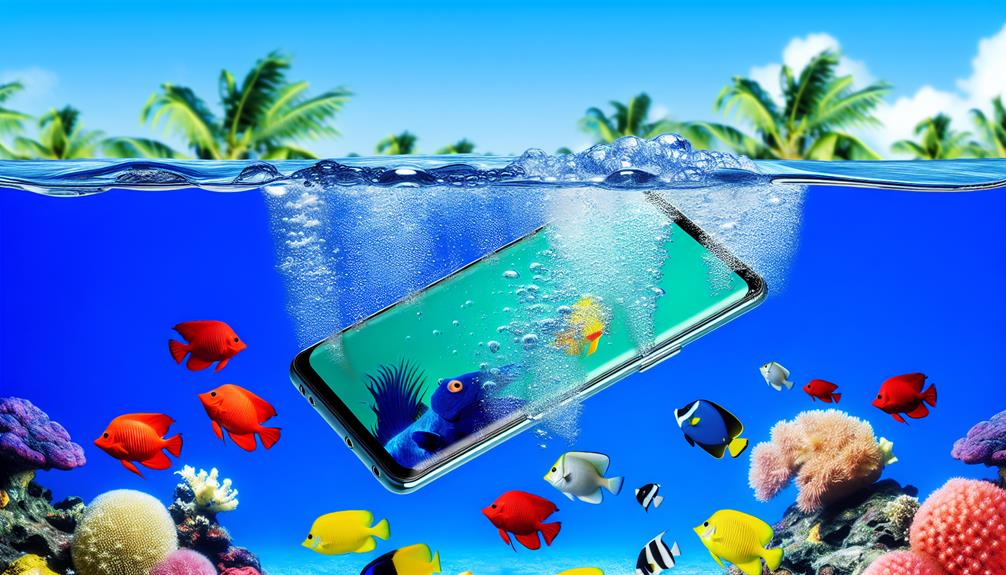
When it comes to the iPhone 14's waterproof capabilities, real-world testing provides valuable insights beyond official ratings. While Apple claims an IP68 rating, which suggests resistance to water immersion up to 6 meters for 30 minutes, actual experiences often tell a different story. User feedback can vary considerably, highlighting how real-life scenarios can impact a device's performance when exposed to water.
Many users have taken the plunge to test their iPhone 14 in different environments, yielding mixed results. Here are three key takeaways from real-life experiences:
- Swimming Pool Mishaps: Some users reported their phones worked flawlessly after accidental drops in the pool, while others experienced issues after just a few seconds underwater.
- Beach Adventures: Sand and saltwater can be a dangerous combination. Feedback indicates that while the device held up against splashes, prolonged exposure to saltwater led to some operational hiccups.
- Rainy Day Reliability: Many found that using their iPhone 14 during light rain didn't cause any problems. However, heavy downpours raised concerns about water seeping into the device.
These insights suggest that while the iPhone 14 is built to withstand moisture, it's not invincible. Your own experiences may vary, and it's crucial to exercise caution. Ultimately, knowing how your device might perform in real-world situations can inform your usage and expectations.
Common Myths About Waterproofing
Have you ever wondered about the myths surrounding waterproofing in smartphones like the iPhone 14? It's vital to separate fact from fiction, especially since many people hold common misconceptions about waterproof technology. One prevalent myth is that if a phone is labeled "waterproof," it can withstand any amount of water exposure. In reality, no device is entirely waterproof. Most smartphones, including the iPhone 14, are rated for water resistance, which means they can handle specific conditions but aren't impervious to all water damage.
Another misconception is that waterproof technology provides protection against all liquids, like saltwater or soda. However, exposure to these substances can still lead to corrosion or damage over time. It's also a myth that you can freely use your phone underwater without any consequences. While some models may survive brief submersions, prolonged exposure can cause failures in the internal components.
Many users believe that their devices remain waterproof indefinitely. In truth, the seals and coatings that provide water resistance can degrade over time or due to wear and tear. Therefore, even if your iPhone 14 is rated for water resistance, it's important to treat it with care.
Understanding these common misconceptions can help you better protect your device. Remember, while waterproof technology offers some level of protection, it's always best to err on the side of caution when it comes to water exposure.
Tips for Protecting Your Iphone
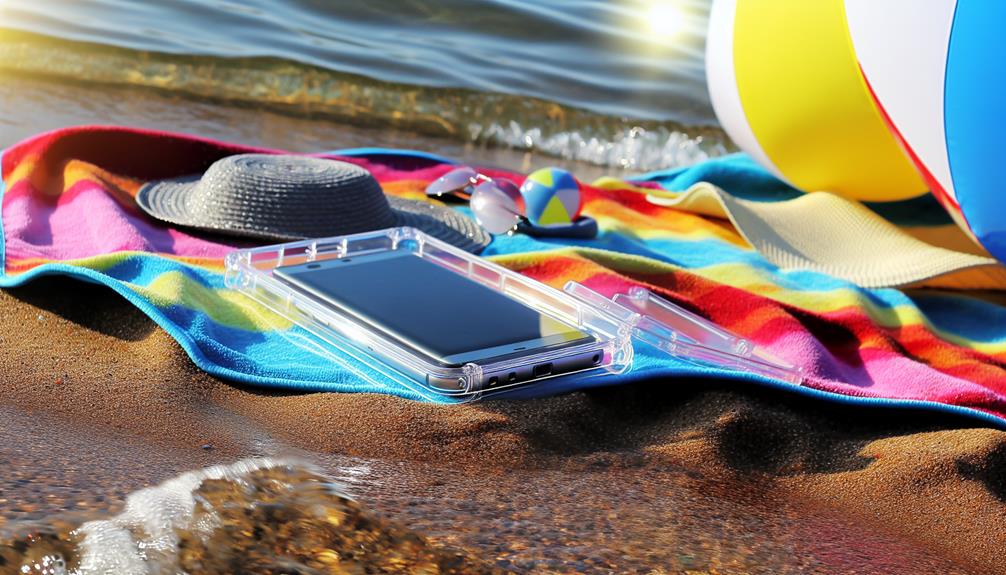
To keep your iPhone safe, using a waterproof case is essential, especially if you're prone to spills or accidents. Additionally, avoiding extreme temperatures can prevent damage to your device's internal components. By following these tips, you can notably extend the life of your iPhone.
Use a Waterproof Case
Investing in a waterproof case can greatly enhance your iPhone's protection against water damage. While the iPhone 14 has some level of water resistance, it's not entirely impervious to water exposure. A waterproof case can provide an extra layer of security, guaranteeing that your device stays safe during aquatic activities or unexpected splashes.
When choosing a waterproof case, consider the following factors:
- Case Materials: Look for high-quality materials that can withstand impact and resist water. Options like silicone and polycarbonate are popular for their durability.
- Waterproof Accessories: Some cases come with additional features, like built-in screen protectors or lanyards, making them more versatile for outdoor use.
- Fit and Design: Ascertain the case fits your iPhone snugly without adding too much bulk, allowing for easy handling.
Avoid Extreme Temperatures
Maintaining the integrity of your iPhone 14 requires vigilance against environmental factors, particularly extreme temperatures. Your device is designed to function efficiently within a specific temperature range—typically between 32°F (0°C) and 95°F (35°C). Exposing your iPhone to temperature effects outside this range can lead to performance issues and potential damage.
In extreme conditions, both high and low temperatures can impact your battery life and overall functionality. For instance, leaving your iPhone in a hot car can cause the battery to overheat, leading to reduced performance or even complete shutdown. Conversely, exposing it to very cold temperatures might cause the battery to drain rapidly or the screen to become unresponsive.
To protect your device, try to avoid leaving it in areas where temperatures can fluctuate dramatically. If you know you'll be in extreme conditions, think about keeping your phone close to your body to maintain a more stable temperature. Additionally, using a protective case can help insulate your iPhone from sudden temperature changes, providing an extra layer of defense against potential damage. By being mindful of temperature effects, you can extend the life of your iPhone 14.
What to Do If Water Damages Your Phone
Water damage can be a smartphone owner's worst nightmare, but knowing how to respond quickly can make all the difference. If your phone gets wet, it's essential to act fast to minimize the damage. Here's what you should do immediately:
- Turn Off the Phone: Don't wait. Power down your phone to prevent short circuits.
- Remove Accessories: Take off any cases or accessories, and remove the SIM card and memory card if possible.
- Dry It Out: Use a soft cloth to gently wipe the exterior. Avoid using heat sources like hair dryers, as they can cause more harm.
Once you've taken these initial steps, consider reaching out to your phone insurance provider. Many policies cover water damage, so you might be able to get a replacement or a repair. Check your policy details to understand what's covered and how to file a claim.
If you're unsure about the extent of the damage, it's best to consult a professional. They can assess the situation and advise you on whether repairs are feasible or if replacing the device is the better option.
Comparing With Previous Iphone Models
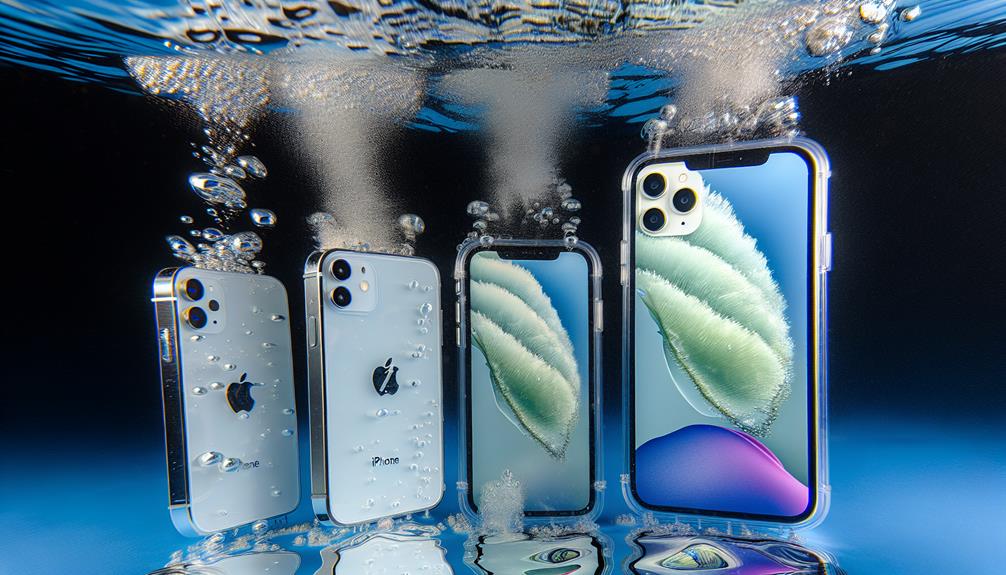
When considering the iPhone 14's waterproof capabilities, it's helpful to compare it with previous models to understand the evolution of Apple's water resistance technology. Each iteration of the iPhone has brought improvements in iPhone durability and water resistance, showcasing Apple's commitment to innovation.
Here's a quick comparison of the water resistance ratings across several iPhone models:
| iPhone Model | Water Resistance Rating |
|---|---|
| iPhone 7 | IP67 |
| iPhone 8 | IP67 |
| iPhone X | IP67 |
| iPhone 11 | IP68 |
| iPhone 12 | IP68 |
| iPhone 13 | IP68 |
| iPhone 14 | IP68 |
As you can see from the table, the iPhone 14 maintains the IP68 rating, which means it's resistant to dust and can withstand submersion in water beyond 1 meter for an extended period. Compared to earlier models like the iPhone 7 and 8, which also have an IP67 rating, the iPhone 14 offers better protection against potential water damage.
This evolution highlights the continuous improvements in comparison features, with Apple enhancing iPhone durability over time. While no device is entirely waterproof, the advancements in water resistance technology provide more peace of mind for users who love to take their phones on outdoor adventures or simply want to avoid accidental spills.
Frequently Asked Questions
Can I Take My Iphone 14 Underwater for Diving?
While you might be tempted to take your iPhone 14 underwater for diving, it's crucial to use proper diving accessories. For underwater photography, consider investing in a waterproof case to guarantee your device's safety.
How Long Can the Iphone 14 Stay Submerged?
When you plunge into the depths of your iPhone 14's capabilities, remember its submersion limits are rated at 6 meters for up to 30 minutes, thanks to rigorous waterproof testing. Don't push those boundaries!
Does Water Damage Void My Warranty?
Water damage typically voids your warranty coverage, so it's essential to handle your device carefully. If you suspect any exposure to water, check the terms of your warranty to understand potential implications.
Can I Use My Iphone 14 in Saltwater?
Oh sure, your iPhone 14 can handle a dip in saltwater—it's practically a mermaid! But remember, saltwater's effects can corrode those waterproof features, so it's best to keep it dry whenever possible.
Is the Iphone 14 Safe for Everyday Rain Exposure?
Your iPhone 14 offers moisture resistance, providing decent rain protection for everyday exposure. However, it's not entirely waterproof, so avoid prolonged wet conditions to guarantee your device remains in peak working condition and protects its internal components.
Conclusion
In summary, while the iPhone 14 boasts an impressive IP68 rating, it's not quite the aquatic marvel some might hope for. Think of it as a sturdy life raft—capable but not impervious. To guarantee your device remains in tip-top shape, it's wise to steer clear of prolonged water exposure and consider a waterproof case for extra peace of mind. Remember, even the most resilient technology needs a little extra care to navigate the waves of everyday life.
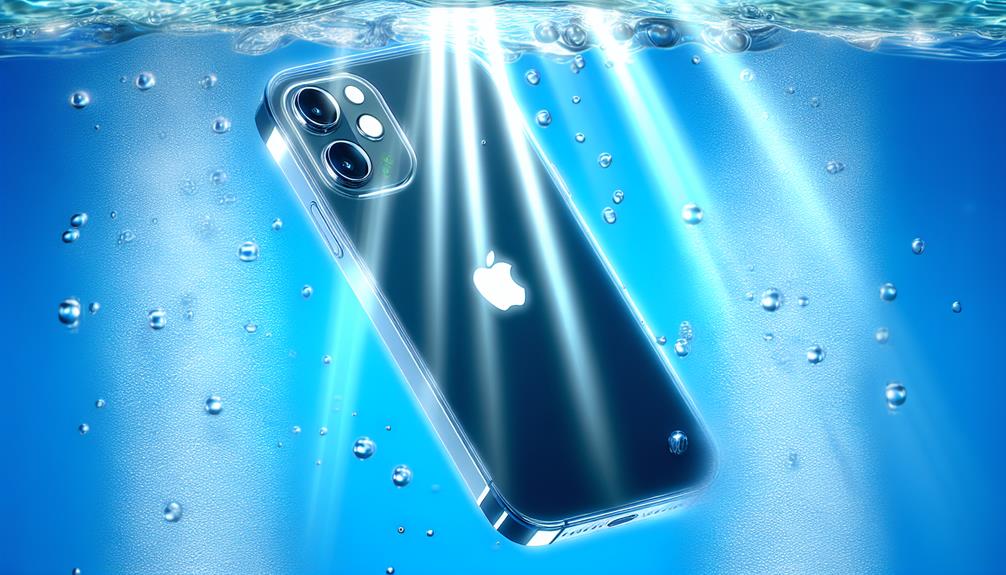



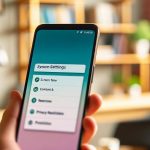
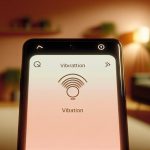
Leave a Reply